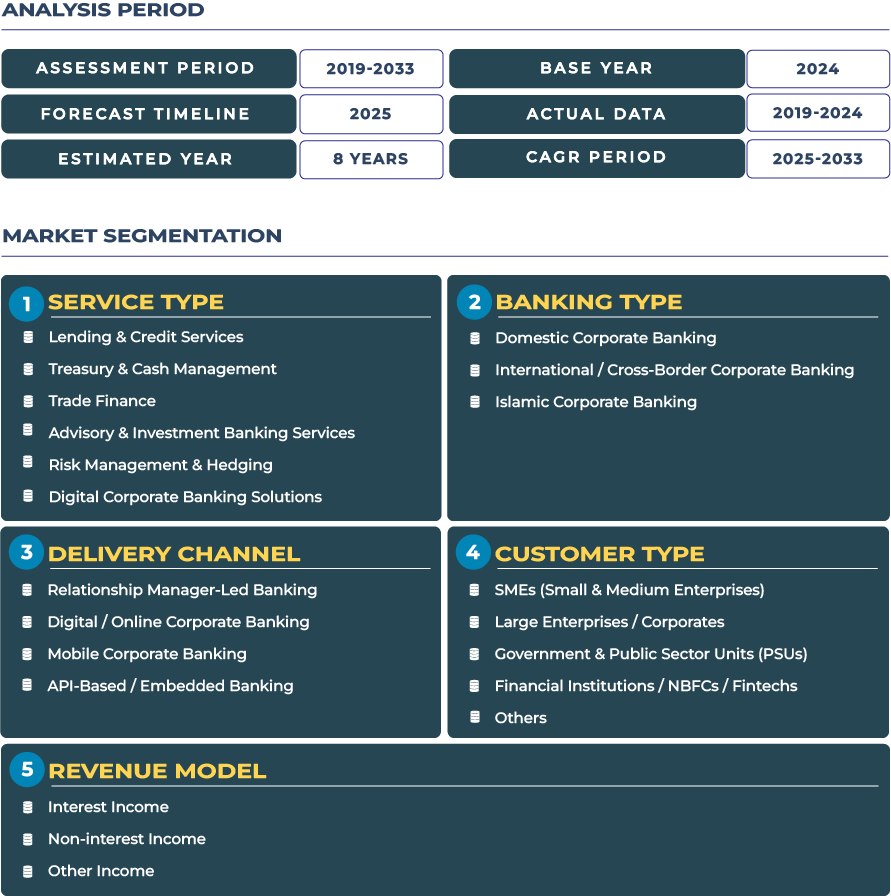Corporate Banking in BRICS: Tailored Solutions for Fast-Growing Emerging Market Corporates
The BRICS Corporate Banking Market is witnessing dynamic growth as banks tailor solutions to serve large, fast-expanding corporate segments across Brazil, Russia, India, China, and South Africa. These emerging markets present substantial opportunities in trade finance, infrastructure funding, and digital corporate banking, driven by strong domestic demand and government-backed economic initiatives. BRICS corporate banks are increasingly focused on developing products that meet the financing needs of exporters, mid-market enterprises, and large conglomerates, while integrating digital platforms for treasury, payments, and risk management.
Note:* The market size refers to the total revenue generated by banks through interest income, non-interest income, and other ancillary sources.
In 2025, the BRICS corporate banking sector is valued at USD 226.5 billion, projected to reach USD 277.2 billion by 2033 at a CAGR of 2.6%. This moderate yet steady growth reflects the combination of expanding corporate financing needs, regional trade activities, and ongoing digital adoption. Banks in the region are leveraging fintech partnerships and digital treasury platforms to support corporates in cross-border transactions, foreign exchange management, and project financing, positioning the BRICS corporate banking ecosystem as a critical enabler of sustainable growth.
BRICS Corporate Banking Market Outlook: Emerging Market Corporates Drive Tailored Banking Solutions Across BRICS
The BRICS corporate banking landscape is characterized by increasing specialization of services to address the unique needs of large corporate clients and mid-market enterprises. Banks are offering customized lending and trade finance products, as well as digital cash management solutions, to accommodate rapid business expansion, particularly in sectors such as infrastructure, energy, and manufacturing. The region’s growing international trade links, combined with rising demand for domestic-currency financing, have spurred banks to develop integrated corporate platforms that streamline treasury, risk, and liquidity management.
Further, BRICS economies are witnessing accelerated adoption of digital corporate banking solutions to enhance operational efficiency and compliance. Governments in India and China are promoting digital payment ecosystems and open banking initiatives, while Brazil and South Africa are expanding regulatory frameworks to facilitate trade finance. These initiatives collectively support a more resilient corporate banking ecosystem capable of sustaining growth amid regional geopolitical and economic uncertainties.
Drivers & Restraints: Understanding Growth Catalysts and Market Challenges in BRICS Corporate Banking
Driving Factors: Large Markets, Infrastructure Capex, and Digital Treasury Adoption
Growth in the BRICS corporate banking market is propelled by substantial domestic corporate financing needs and infrastructure expansion. Countries like India, China, and Brazil are witnessing large-scale industrial projects and energy developments, necessitating long-term capital and syndicated lending solutions. Additionally, corporates increasingly adopt digital treasury platforms for liquidity optimization, risk management, and multi-currency cash management. Financial institutions are leveraging technology to provide real-time reporting, automated reconciliations, and embedded trade finance solutions, improving operational efficiency for multinational and domestic clients alike.
Restraining Factors: Policy Volatility, Banking Openness, and Regulatory Gaps
Despite growth momentum, the BRICS corporate banking sector faces challenges including policy and currency volatility, which can affect lending and risk assessment. Differences in capital controls, market openness, and regulatory transparency across member nations create operational and compliance hurdles for banks and corporates. For example, Russia and South Africa have stricter capital and foreign exchange controls compared to Brazil or India, limiting cross-border liquidity flexibility. These factors necessitate enhanced risk management practices and bespoke product offerings to mitigate market uncertainties.
Trends & Opportunities: Digital Integration, Green Financing, and Domestic Currency Solutions
Major Trends: Domestic Currency Settlement, Green Infrastructure, and Syndicated Financing
The BRICS corporate banking industry is increasingly focused on domestic-currency settlements to reduce foreign exchange exposure. Simultaneously, green infrastructure financing is gaining momentum, with banks actively supporting renewable energy projects and sustainable urban development. Syndicated and project finance solutions remain in high demand, enabling risk-sharing among financial institutions while addressing large-scale corporate financing needs. Digital platforms are being leveraged for real-time monitoring, cross-border payments, and automated risk assessments, enhancing operational efficiency across the BRICS ecosystem.
Opportunities: Project Finance, Domestic Cash Management, and Green Lending Syndicates
Opportunities abound in project financing for infrastructure and industrial expansion, particularly in India, China, and Brazil. Banks are also offering domestic-currency cash management suites that allow corporates to optimize liquidity while minimizing FX risk. Green infrastructure lending syndicates are emerging as a significant avenue for sustainable financing, allowing corporates to access low-cost capital for environmentally aligned projects. These developments position BRICS banks to support corporates in achieving growth while adhering to evolving environmental, social, and governance standards.
Regional Analysis by Country
Brazil
Brazil corporate banking market is led by domestic banks offering trade finance, infrastructure lending, and cash management solutions for energy and industrial sectors. Digital adoption is accelerating in response to regulatory initiatives by Banco Central do Brasil.Russia
Russia’s market emphasizes domestic currency lending, FX hedging, and project finance for energy and infrastructure, supported by state-backed financing frameworks.India
India corporate banking ecosystem is driven by SME financing, infrastructure project loans, and digital treasury adoption, enabled by initiatives from Reserve Bank of India.China
China focuses on trade finance, digital cash management, and green project financing, leveraging regulatory support for domestic currency and cross-border corporate operations.South Africa
South Africa corporate banking landscape emphasizes infrastructure and mining sector finance, syndicated lending, and digital integration for corporates operating regionally and globally.
Competitive Landscape: BRICS Banks Enhance Tailored Solutions and Digital Offerings
Leading players in the BRICS corporate banking sector include Itaú Unibanco, Sberbank, HDFC Bank, ICBC, and Standard Bank. These banks are expanding offerings in domestic-currency working capital suites, green infrastructure lending syndicates, and FX hedging solutions for exporters. Recent initiatives include HDFC Bank’s launch of a digital project finance platform in 2024 and ICBC’s expansion of green lending programs for Chinese corporates, demonstrating a focus on sustainable, digital-enabled corporate banking solutions.








